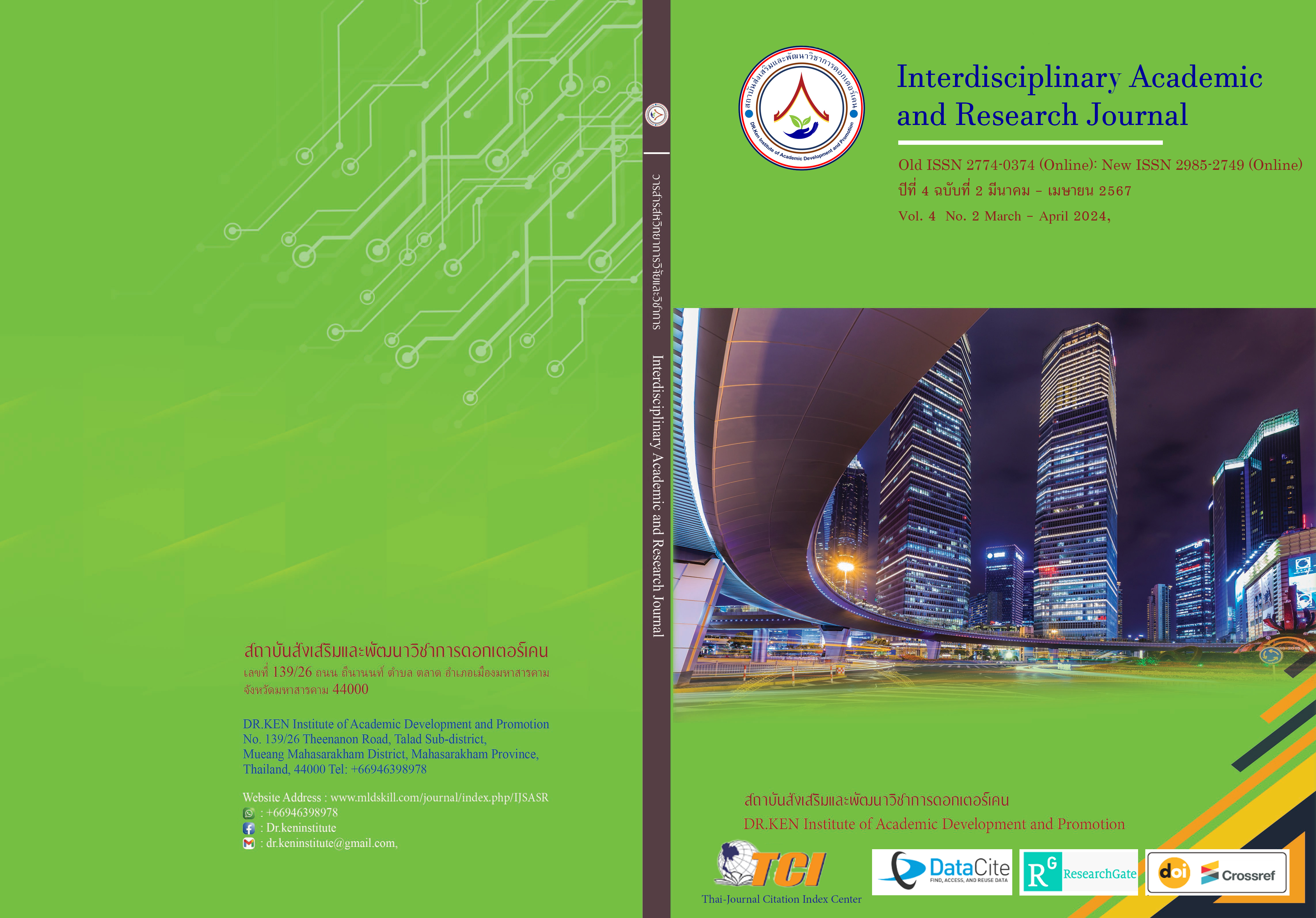The Guidelines for Development the Servant Leadership of School Administrators under the Mahasarakham Primary Educational Service Area Office 3
DOI:
https://doi.org/10.60027/iarj.2024.274652Keywords:
Guidelines for Development; , Servant Leadership; , School AdministratorsAbstract
Background and Aims: School administrators who follow the concept of servant leadership will give importance to and recognize the value of co-workers and will pay attention to developing the potential of co-workers. Ignore personal interests to get what others want and help others develop, to grow. Therefore, this research aims to study the current state, the desirable state, and the priority needs and study the guidelines for the development of the servant leadership of school administrators under the Mahasarakham primary educational service area office 3.
Methodology: The research is divided into 2 phases: Phase 1 studies the current state, desirable state, and the priority needs of servant leadership of school administrators, A sample group of 280 school administrators and teachers, was randomly selected using a stratified sampling method. The research instrument is a questionnaire with a 5-level with a confidence value of 0.93 and data analysis by mean and standard deviation. phase 2 study of the guidelines for the development of servant leadership of school administrators. The key informant group comprises 3 best practice schools and 9 experts for assessment of the development guideline. The research instrument was a semi-structured interview form and assessment form the suitability and feasibility of development guideline
Results: 1. The current state overall was high level; desirable state overall was the highest level. The priority needs ranked from high to low level were humility, service, awareness, empowerment, and human development dedication, respectively. 2. The guidelines for the development of servant leadership of School administrators include 5 elements 1) principle 2) purpose 3) content 4) development process and 5) measurement and evaluation. The results of the evaluation of the suitability and feasibility of development guidelines overall were at the highest level.
Conclusion: The servant leadership style of school administrators involves fulfilling responsibilities with an understanding and practice of prioritizing the needs of others over one's own, placing the benefits of others above personal gains, and adding value to the development of others. This is done for the needs of others and the decentralization of power. The key components include: humility, service, awareness, empowerment, and human development dedication
References
เรืองชัย จรุงศิรวัฒน์. (2554). เทคนิคการเขียนคู่มือปฏิบัติงาน. ขอนแก่น : สำนักงานอธิการบดี มหาวิทยาลัยขอนแก่น.
กล้า ทองขาว. (2552). วิกฤติภาวะผู้นำทางการศึกษาแนวทางการวิจัยและการพัฒนา. กรุงเทพ: โรงพิมพ์มหาวิทยาลัยธุรกิจบัณฑิต.
จิรวรรณ เล่งพานิชย์. (2554). โมเดลสมการโครงสร้างภาวะผู้นำแบบใฝ่บริการของผู้บริหารสถานศึกษาขั้นพื้นฐาน. วิทยานิพนธ์ปริญญาดุษฎีบัณฑิต: มหาวิทยาลัยขอนแก่น.
ธีระ รุญเจริญ. (2550). ความเป็นมืออาชีพในการจัดและบริหารการศึกษายุคปฏิรูปการศึกษา. กรุงเทพฯ: ข้าวฟ่าง.
นันท์มนัส รอดทัศนา. (2554). การจัดทำคู่มือจัดกิจกรรมพัฒนาความมีวินัยของนักเรียนชั้นประถมศึกษาปีที่ 6 โรงเรียนสารสาสน์วิเทศบางบอน. วิทยานิพนธ์การศึกษามหาบัณฑิต. กรุงเทพฯ : มหาวิทยาลัยศรีนครินทรวิโรฒ.
ปรีชา ช้างขวัญยืน. (2554). เทคนิคการเขียนและผลิตตารา. กรุงเทพฯ: โรงพิมพ์แห่งจุฬาลงกรณ์.
ปองภพ ภูจอมจิตร (2555). การพัฒนาตัวบ่งชี้ภาวะผู้นำแบบใฝ่บริการของผู้บริหารสถานศึกษาขั้นพื้นฐาน. วิทยานิพนธ์ครุศาสตรดุษฎีบัณฑิต (การบริหารจัดการศึกษา): มหาวิทยาลัยราชภัฏมหาสารคาม
พระพรหมคุณาภรณ์ (ป.อ. ปยุตฺโต). (2550). การพัฒนาที่ยังยืน. พิมพ์ครั้งที่ 3. กรุงเทพฯ: สหธรรมิก.
พิชาวีร์ เมฆขยาย. (2550). การพัฒนาหลักสูตรการอบรมภาวะผู้นำแบบผู้รับใช้สำหรับผู้นำกิจกรรมนิสิต มหาวิทยาลัยเกษตรศาสตร์. กรุงเทพฯ: มหาวิทยาลัยเกษตรศาสตร์.
สถาบันพัฒนาครูและบุคลากรทางการศึกษา. (2554). คู่มือการพัฒนาข้าราชการครูและบุคลากรทางการศึกษาก่อนแต่งตั้งใหม่และเลื่อนเป็นวิทยฐานะผู้อํานวยการและรองผู้อํานวยการสำนักงานเขตพื้นที่การศึกษาเชี่ยวชาญหรือผู้อำนวยการและรองผู้อํานวยการสำนักงานกศน.จังหวัด/กรงเทพมหานครเชี่ยวชาญ สำหรับผู้ดำเนินการพัฒนาและผู้เข้ารับการพัฒนา. นครปฐม: สถาบันพัฒนาครูและบุคลากรทางการศึกษา สำนักงานปลัดกระทรวง.
สัมฤทธิ์ กางเพ็ง และ สรายุทธ กันหลง. (2553). ภาวะผู้นำใฝ่บริการในองค์การ : แนวคิดหลักการ ทฤษฎี และงานวิจัย. พิมพ์ครั้งที่ 2. ขอนแก่น: คลังนานาวิทยา.
สำนักงานเขตพื้นที่การศึกษาประถมศึกษามหาสารคาม เขต 3. (2566). แผนปฏิบัติราชการประจำปีงบประมาณ 2566. มหาสารคาม : กลุ่มนโยบายและแผนสำนักงานเขตพื้นที่การศึกษาประถมศึกษามหาสารคาม เขต 3.
สำนักงานเขตพื้นที่การศึกษามัธยมศึกษา เขต 1. (2561). คู่มือปฏิบัติงานกลุ่มพัฒนาครูและบุคลากรทางการศึกษา. กรุงเทพฯ: กลุ่มบริหารงานบุคคล สำนักงานเขตพื้นที่การศึกษามัธยมศึกษา เขต 1.
สำนักงานคณะกรรมการการศึกษาขั้นพื้นฐาน. (2562). การพัฒนาข้าราชการครูและบุคลากรทางการศึกษาก่อนแต่งตั้งให้ดำรงตำแหน่งผู้อำนวยการสถานศึกษา. กรุงเทพฯ : สำนักพัฒนาระบบบริหารงานบุคคลและนิติการ.
สุเทพ พงศ์ศรีวัฒน์. (2558). ภาวะความเป็นผู้นำ. กรุงเทพฯ: ส.เอเซียเพรส.
สุวิมล ว่องวาณิช. (2558). การวิจัยประเมินความต้องการจำเป็น. กรุงเทพฯ: สานักพิมพ์แห่งจุฬาลงกรณ์มหาวิทยาลัย.
Black, W.R. (2010). Sustainable Transportation: Problems and Solutions. The Guilford Press, New York, London.
Cronbach, L.J. (1970). Essentials of Psychological Testing. 3rd edition. New York: Harper. And Row.
Daft, R.L. (2005). The leadership experience. 3rd edition. Mason, OH: Thomson South-Western.
Dennis, R. S., & Bocarnea, M. (2005). Development of the servant leadership assessment instrument. Leadership & Organization Development Journal, 26(8), 600–615. https://doi.org/10.1108/01437730510633692
Dennis, R.S. (2004). Development of the servant leadership assessment. Dissertation Abstracts International (UMI No. 3133544).
Greenleaf, R. K. (2002). Servant-Leadership: A Journey into the Nature of Legitimate Power and Greatness. Mahwah, NJ: Paulist Press.Greenleaf, R.K. (1977). The servant as leader. Indianapolis. Illinois: The Robert K. Greenleaf Center.
Krejcie, R.V., & Morgan, D.W. (1970). Determining sample size for research activities. Educational and Psychological Measurement, 30(3), 607–610.
Russell, R. F. & Stone. (2002). A review of servant leadership attributes: Developing a Practical Model. Journal of Leadership & Organizational Studies, 23(3), 145–157. https://doi.org/10.1108/01437730210424
Shaffer, J. (2000). The Leadership solution. New York: McGrew-Hill.
Downloads
Published
How to Cite
Issue
Section
License
Copyright (c) 2024 Interdisciplinary Academic and Research Journal

This work is licensed under a Creative Commons Attribution-NonCommercial-NoDerivatives 4.0 International License.
Copyright on any article in the Interdisciplinary Academic and Research Journal is retained by the author(s) under the under the Creative Commons Attribution-NonCommercial-NoDerivatives 4.0 International License. Permission to use text, content, images, etc. of publication. Any user to read, download, copy, distribute, print, search, or link to the full texts of articles, crawl them for indexing, pass them as data to software, or use them for any other lawful purpose. But do not use it for commercial use or with the intent to benefit any business.
















.png)


